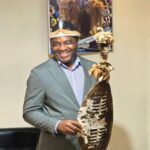By GRACE CHAILE
THE family of late former Republican President Edgar Lungu has told the South African High Court that the former head of State never wished that President Hakainde Hichilema should preside over his funeral or be anywhere near his mortal remains.
The family of late former President Lungu has also denied ever entering into any form of agreement with the Zambian government for the remains of the former head of State to be repatriated for burial in Zambia.
Esther Lungu, the widow to former President Lungu and her family, through their lawyers were testifying before a three-judge panel composed of Deputy Judge-President Aubrey Ledwaba, Acting Deputy Judge-President Phanuel Mudau, and Judge Potterill.
Mrs Lungu appeared in the South African High Court under tight security alongside close family members.
Inside the courtroom, she sat silently in the gallery, while outside, a small group of individuals, purportedly South African nationals gathered in support of the Zambian government’s position, waving placards and singing songs calling for Mr Lungu’s remains to be returned to Zambia.
The family’s legal representative, Advocate C.J. Welgemoed, strongly argued that the court lacked jurisdiction to enforce any alleged agreement on repatriation, stating that all material circumstances connected to the matter occurred in South Africa, including the death of former President Lungu.
He submitted that former President Lungu was mistreated, harassed and humiliated by the UPND government to the extent of stripping him of the recognition due to a former head of State.
“If he (former President Lungu) had been treated like a late President, we would not be having this conversation. His benefits were stripped. He made it clear he wanted nothing to do with the current president, and said so repeatedly. It was his wish that the current president not be involved in his funeral in any way,” Welgemoed said.
Mr Welgemoed maintained that the family, particularly Esther Lungu, the widow wished for the late former head of State to be buried in South Africa in accordance with his personal desires.
He argued that enforcing a repatriation would dishonour those wishes, especially if President Hichilema were allowed to preside over the funeral proceedings or indeed be allowed to view the remains of the late former President.
“His wish was clear, it would be undignified for him to be buried under the authority or presence of the current President,” he told the bench. “If the court can determine what the deceased’s wish was, then it can enforce it.”
However, representing the Zambian State, Advocate B.C. Stoop, SC, claimed that there was a clear agreement between the family and the State for Mr Lungu’s remains to be transported back to Zambia via private charter for a state funeral.
He argued that funeral rights, including the presence of the head of state, were part of the constitutional obligations that could not be waived by personal wishes alone.
“There is no evidence that the deceased ever expressed a wish to be buried in South Africa,” he said. “In fact, the agreement was that the President may attend if foreign dignitaries are present. Military honours necessitate that the head of state presides. That does not mean the family’s rights are being violated.”
Mr Stoop argued that under the Benefits of Former Presidents Act, any suspension of Mr Lungu’s entitlements due to his political activities ceased upon death, and his widow stood to benefit from a house, vehicle, and other entitlements, all documented in the court records.
The court also addressed an ex parte order obtained by the State to view the body. Mr Welgemoed clarified that the family sought court clarity only after learning that the State might attempt to move the body against their understanding of the court order.
“We approached the court because we believed the order meant the body was to remain with the undertaker until proceedings concluded,” he said. “Any unilateral action to bury him in the meantime would undermine the court process.”
The three-judge panel acknowledged the urgency of the matter and assured both parties that judgment would be delivered by Friday.








